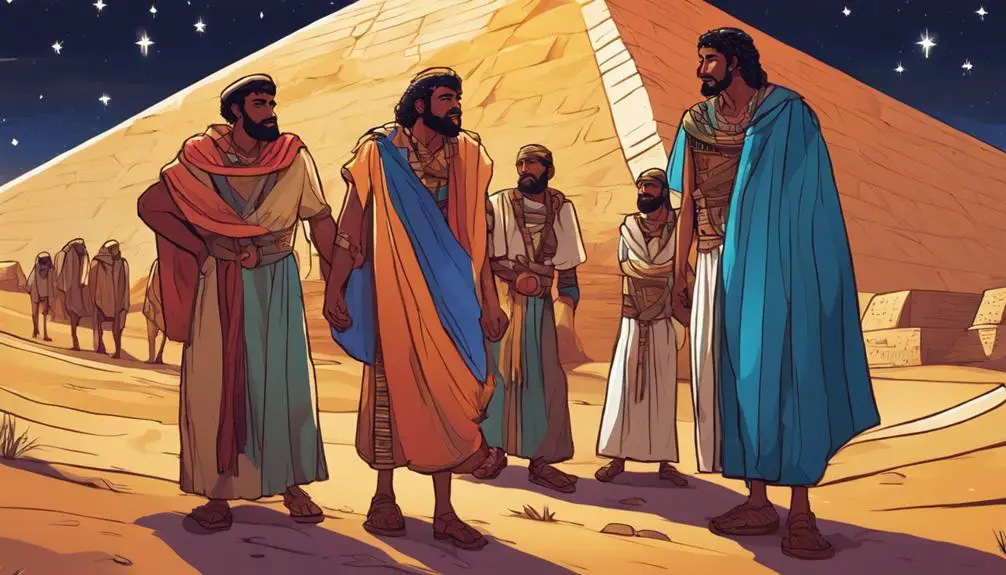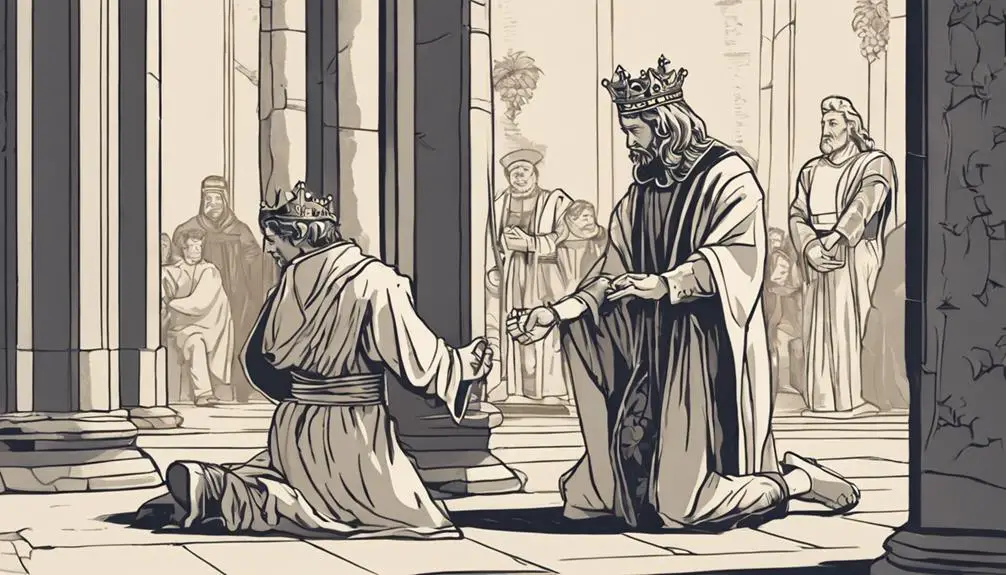Explore captivating Bible stories on forgiveness that mirror our lives, offering deep insights and transformative perspectives.

Stories on Forgiveness in the Bible
Isn't it curious how the theme of forgiveness weaves through your life, just as it does through the stories in the Bible?
You'll find that tales like the Prodigal Son, Joseph and His Brothers, and Jesus forgiving Peter aren't just ancient texts; they mirror the complexities and the grace of forgiveness in our daily interactions.
As you consider these narratives, think about how they reflect upon your own experiences with forgiveness.
The journey through these stories might offer you insights into forgiveness that are both profound and personally transformative, leaving you with thoughts to ponder and perhaps, a new perspective on forgiveness.
Key Takeaways
- Biblical stories of forgiveness showcase mercy, grace, and the importance of reconciliation.
- Forgiveness in the Bible often leads to personal transformation and healing of relationships.
- The act of forgiving is depicted as a powerful gesture of love that can inspire change.
- These narratives emphasize that forgiveness is central to faith and spiritual growth.
The Prodigal Son

The Parable of the Prodigal Son serves as a pivotal example of forgiveness and redemption in biblical literature, illustrating how mercy can triumph over judgment. This story, deeply embedded in Christian doctrine, provides a rich narrative for exploring themes of family reconciliation and personal transformation. It narrates the journey of a young man who, after squandering his inheritance, returns home to seek forgiveness from his father. This act of returning symbolizes a profound personal transformation, underscoring the narrative's emphasis on repentance and the power of grace.
Analyzing this parable, you'll find that the father's response to his younger son's return isn't predicated on retribution but on unconditional love and acceptance. This response is emblematic of the possibility of reconciliation within families, even after serious transgressions. The father's actions—running to meet his son, embracing him, and celebrating his return—serve as a powerful metaphor for divine forgiveness, illustrating that redemption is always within reach, regardless of one's past actions.
Furthermore, the elder son's reaction introduces a critical examination of jealousy and entitlement within familial relationships, providing a comprehensive depiction of the challenges and complexities inherent in achieving true family reconciliation.
Joseph and His Brothers

In the tale of Joseph and his brothers, one encounters a profound narrative of betrayal, suffering, and, ultimately, magnanimous forgiveness that challenges and enriches our understanding of reconciliation and redemption. This story, deeply embedded within the fabric of biblical lore, serves not only as a testament to the endurance of familial bonds but also as a pivotal discourse on the complexities of human emotion and the power of forgiveness.
Central to this narrative is the theme of Family Reconciliation, underscored by Joseph's journey from being sold into slavery by his own brothers to his rise to power in Egypt. It's through Joseph's ability to interpret dreams, a critical skill that ultimately saves Egypt and his family from famine, that the stage for reconciliation is set. Dream Interpretation, in this context, isn't merely a plot device but a symbol of Joseph's divine wisdom and forethought.
The resolution of this story, where Joseph forgives his brothers, despite their grave betrayal, offers a compelling exploration of the capacity for forgiveness. It underscores the notion that true reconciliation requires a profound understanding of human frailty, a willingness to forgive, and an acknowledgment of the transformative power of forgiveness in healing and uniting families.
Jesus Forgives Peter

Shifting our focus from the Old Testament to the New, we encounter another profound narrative of forgiveness, where Jesus forgives Peter for his denial. This moment is pivotal, not just for its immediate emotional impact but for its implications on rebuilding trust and leadership restoration within the early Christian community.
Aspect |
Description |
Implications |
|---|---|---|
Peter's Denial |
Peter denies knowing Jesus thrice before the rooster crows. |
Crisis of faith and loyalty. |
Jesus' Prediction |
Jesus predicts Peter's denial, demonstrating foreknowledge and compassion. |
Understanding and forebearance. |
Forgiveness Offered |
Post-resurrection, Jesus asks Peter three times if he loves Him, symbolically offering forgiveness. |
Rebuilding trust, reaffirming commitment. |
Leadership Restored |
Jesus charges Peter to "feed my sheep," restoring him as a leader. |
Leadership restoration, community rebuilding. |
Symbolism |
The thrice-repeated question mirrors the three denials, emphasizing forgiveness and redemption. |
Comprehensive forgiveness, new beginnings. |
This narrative underscores the power of forgiveness in restoring relationships and leadership roles. Jesus' approach to forgiving Peter illustrates a model of compassion and foresight, emphasizing the potential for renewal even after serious failings. It's a compelling example of how forgiveness can rebuild trust and restore individuals to positions of responsibility and influence within their communities.
The Unmerciful Servant

Another compelling narrative of forgiveness within the New Testament is found in the parable of the Unmerciful Servant, highlighting the stark consequences of failing to extend mercy after receiving it oneself. This story underscores the expectation of a heart transformation following debt forgiveness, yet it illustrates a failure to manifest this change.
Consider the following key elements in the parable:
- The Initial Act of Mercy: A servant owes a massive debt to his king, which he can't repay. In an act of profound mercy, the king forgives this debt, expecting nothing in return.
- The Servant's Response: Instead of allowing this act of forgiveness to transform his heart, the servant demands repayment of a much smaller debt from a fellow servant, refusing to show the mercy he himself received.
- The Consequences: When the king learns of the servant's lack of mercy, he revokes the previously granted forgiveness, delivering the unmerciful servant to jailers until he can repay his debt in full.
This narrative serves as a powerful reminder of the expected heart transformation that should accompany the act of forgiveness. It emphasizes the necessity of extending mercy to others, particularly when one has been a recipient of such grace.
David and Mephibosheth

The story of David and Mephibosheth vividly exemplifies the transformative power of kindness and loyalty, revealing the depths of forgiveness that can alter the course of lives. When you delve into the narrative, you uncover a scenario where David's generosity towards Mephibosheth, the grandson of his predecessor and once enemy Saul, emerges not out of obligation but from a profound sense of loyalty and remembrance of his bond with Jonathan, Saul's son.
David's decision to restore all the lands of Saul to Mephibosheth and ensure his constant presence at the king's table is emblematic of forgiveness and reconciliation transcending generations of conflict. This act isn't merely a gesture of goodwill but a deliberate effort to mend the fractured bonds between families and to forge a path of peace where enmity once reigned.
Mephibosheth's loyalty, in response, is equally significant. Despite his initial vulnerability and potential mistrust towards David, Mephibosheth's acceptance of David's kindness illustrates the reciprocal nature of forgiveness. His gratitude and allegiance to David underscore a mutual respect that defies the historical animosity between their families.
Through this narrative, the biblical text articulates a profound truth: acts of generosity and loyalty have the power to heal old wounds and bridge the deepest divides, showcasing a timeless model of forgiveness and reconciliation.
The Stoning of Stephen

In the biblical account of Stephen's stoning, we observe a poignant illustration of the ultimate sacrifice for faith, reflecting stark contrasts between conviction and intolerance. Stephen's story isn't just a tragic narrative of Early Martyrdom; it's a complex tapestry woven with themes of forgiveness, steadfast belief, and the unforeseen seeds of transformation it planted, particularly in Saul's Conversion.
Analyzing this account, you discover several key elements:
- Stephen's Unwavering Faith: Despite facing imminent death, Stephen's resolve in his belief showcases the profound strength of faith under persecution. His speech, rich in scriptural references, doesn't waver even as he faces his aggressors.
- The Role of Forgiveness: In his final moments, Stephen's plea for forgiveness for his executioners mirrors Christ's own words on the cross, highlighting a recurring biblical theme of forgiving those who wrong us, even in the face of death.
- Saul's Conversion: Witnessing Stephen's stoning, Saul (later Paul) embarks on a journey from being a persecutor of Christians to one of Christianity's most ardent apostles. Stephen's death marks a pivotal moment, illustrating how acts of faith and forgiveness can catalyze profound spiritual transformation.
Through Stephen's martyrdom, we're reminded of the power of forgiveness and the unpredictable ripples it can create, influencing even the unlikeliest of hearts.
Frequently Asked Questions
How Does the Concept of Forgiveness in the Bible Compare to Forgiveness in Other Major World Religions?
When you compare the concept of forgiveness in the Bible to other major world religions, you're delving into comparative ethics and ritual practices. Each tradition emphasizes forgiveness but approaches it through unique lenses.
You'll find that while the Bible often portrays forgiveness as a divine command and personal virtue, other religions may integrate forgiveness into ritual practices or view it as part of a broader ethical framework. Analyzing these differences offers rich insights into the values of each tradition.
What Psychological Benefits Does the Act of Forgiving, as Depicted in the Bible, Have on an Individual According to Modern Psychology?
When you forgive, your brain engages in a transformative process. Forgiveness physiology and neurological impacts intertwine, enhancing your well-being. Modern psychology suggests that forgiving reduces stress, lowers blood pressure, and improves heart health. It's not just emotional relief; there's a physical dimension too.
Your body's stress response diminishes, promoting healing. This act, deeply rooted in empathy and understanding, not only liberates the forgiven but profoundly heals the forgiver, embodying a dual path to wellness.
Are There Instances in the Bible Where Forgiveness Is Withheld, and What Are the Consequences Presented in Those Stories?
Yes, there are instances where forgiveness isn't granted, highlighting the concepts of Divine Justice and Human Retribution. These narratives serve as powerful reminders of the consequences when forgiveness is withheld, often resulting in turmoil and suffering.
They underscore the importance of forgiveness in maintaining harmony and the potential for negative outcomes when it's absent. These stories aren't just moral lessons; they delve into the complex interplay between justice, retribution, and the human condition.
How Has the Theme of Forgiveness in the Bible Been Interpreted or Misinterpreted in Contemporary Society and Culture?
In today's digital age, the theme of forgiveness has been both celebrated and criticized, often misinterpreted through the lens of legal ramifications and political manipulation.
You see, forgiveness, a core value in many cultures, is sometimes weaponized for personal gains rather than embraced for its healing power. This distortion affects societal views, leading to a misunderstanding of its true essence, and overlooks the profound impact forgiveness can have on individual and collective growth.
What Role Does Forgiveness Play in Societal or Communal Healing, as per Biblical Narratives, Beyond the Individual Stories Mentioned?
In exploring the role of forgiveness in societal or communal healing, it's essential to consider how it fosters community rebuilding and embodies peacemaking principles.
You'll find that forgiveness acts as a foundational element in healing divisions and restoring harmony. It encourages empathy, understanding, and cooperation, key factors in overcoming communal challenges.
Analytically, forgiveness not only reconciles individuals but also reconstructs societal bonds, promoting a culture of peace and mutual respect.
Conclusion
In analyzing these biblical narratives, you've traversed a landscape where forgiveness emerges as a divine imperative, echoing through the ages. The emotional resonance of tales like the Prodigal Son or the poignant forgiveness Stephen shows amidst stones underscores a profound truth: forgiveness is less about the other and more about liberating oneself from the chains of bitterness.
These stories, then, aren't just ancient texts but living testimonies to the transformative power of grace and mercy in human hearts.



Sign up